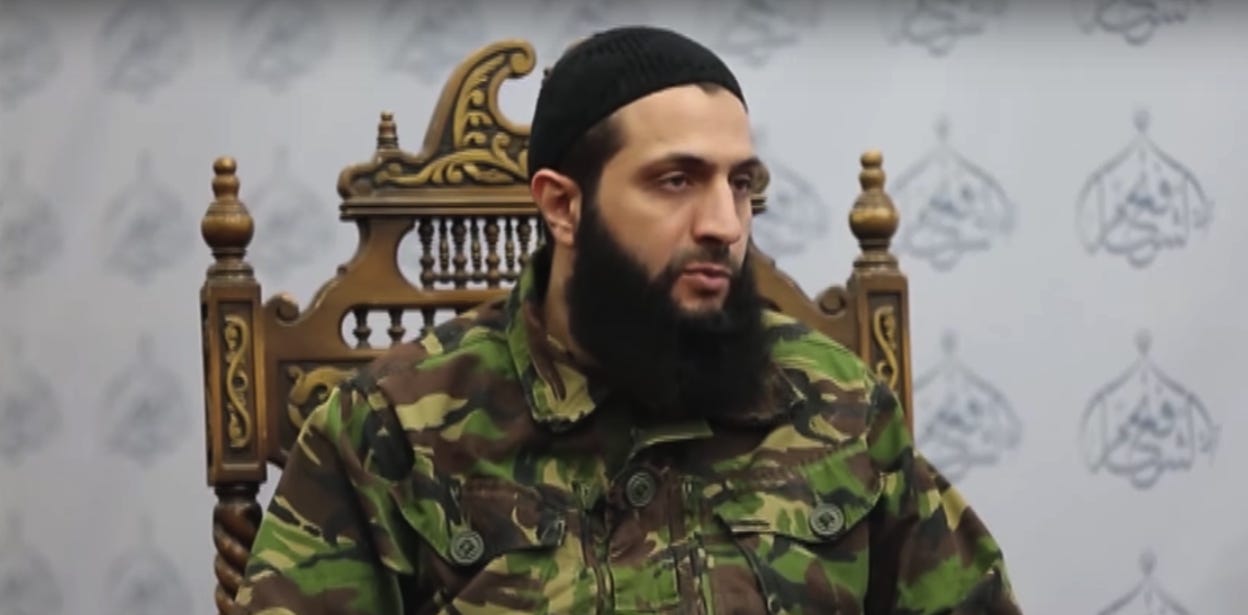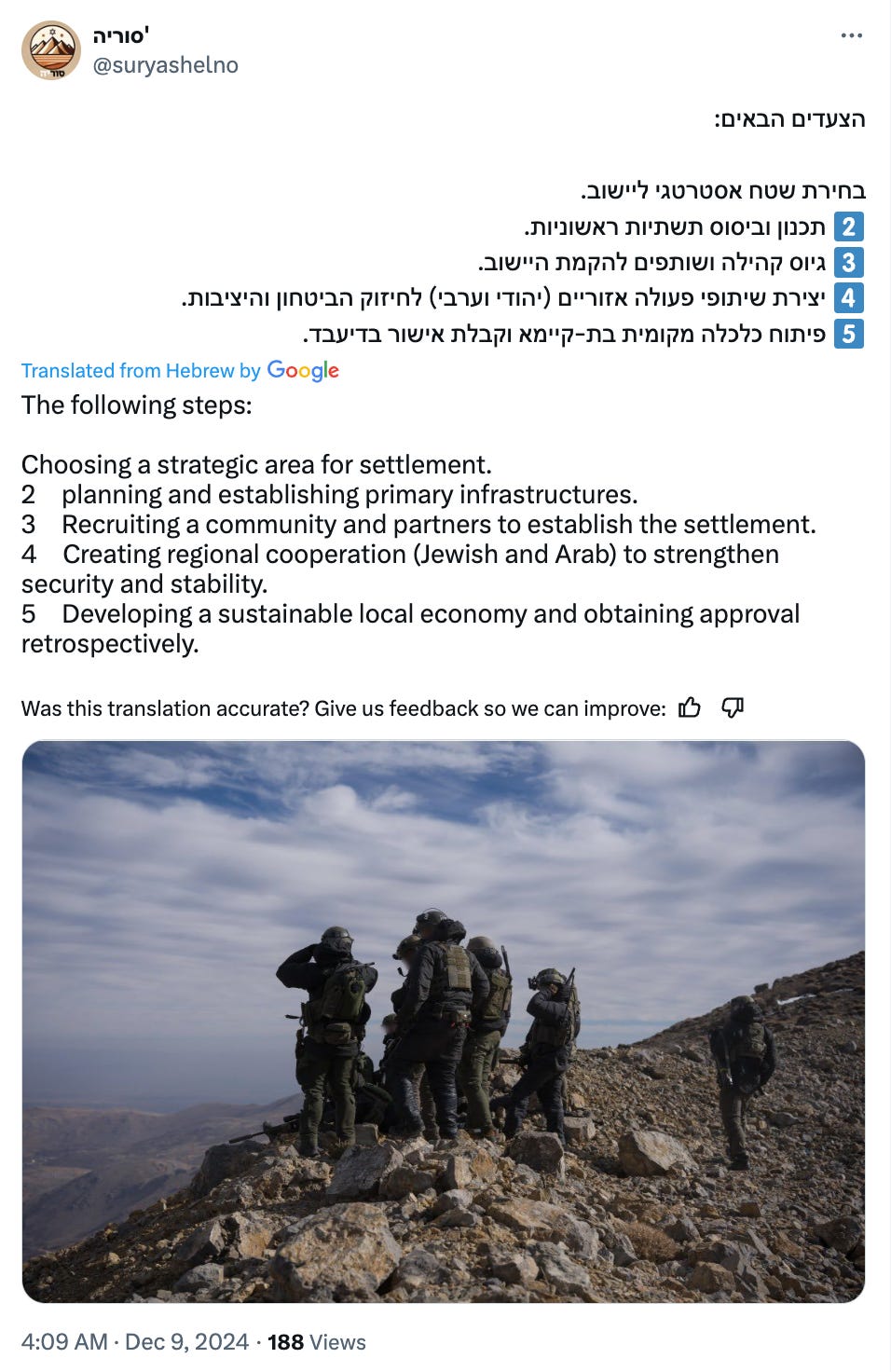Syrian "Revolutionaries" Welcome Israel as it Invades Country They Claim to Have Liberated
As Israel deepens its occupation of the Golan Heights and destroys Syria's defensive capabilities, anti-Assad forces embrace it as an ally.
On December 8, Hayat Tahrir al-Sham leader Abu Mohammed Al-Jolani walked through the cool Damascus air, before prostrating himself in prayer.
Al-Jolani and his band of Turkish-backed insurgents had just conquered the Syrian cities of Aleppo, Homs, Hama and Damascus, the seat of Bashar Al-Assad’s government.
Their lightning offensive faced little resistance from Syria’s military forces, which inexplicably retreated, leaving observers on all sides shocked by the sudden collapse of an army that had spent more than a decade successfully defending against an array of foreign-backed mercenaries and extremist groups.
Around the same time as Al-Jolani strode through Damascus, Israeli prime minister Benjamin Netanyahu appeared in an outpost on Mount Hermon in the occupied Golan Heights that retreating Syrian forces had just evacuated.
“This collapse is a direct result of our forceful action against Hezbollah and Iran, Assad’s main supporters,” Netanyhahu boasted, which “set off a chain reaction of all those who want to free themselves from this tyranny and its oppression.”
Indeed, the Syrian state’s sudden collapse represents a major victory for Israel in its war against the regional array of counter-hegemonic forces known as the “Axis of Resistance.”
Al-Jolani’s HTS, which terrorized Syrian religious minorities and imposed a strict Wahhabist interpretation of Islamic law in its stronghold of Idlib, is now set to take over areas of Syria formerly under the control of the Assad government, while others remain under the control of U.S.-backed Kurdish separatists and the U.S. military itself.
While Israeli officials have sought in the past to downplay the well-documented links between Israel and opposition forces in Syria, with Assad out of power, the veil is now being lifted.
Speaking with Jewish Insider, Brigadier General (res.) Yossi Kuperwasser, former Israeli military intelligence chief and Director General of Israel’s Strategic Affairs Ministry , now a senior research fellow at the Jerusalem Center for Security and Foreign Affairs and the Misgav Institute for National Security, admitted that the danger from putschist forces in Syria to Israel “exaggerated.”
“Their first mission is to stabilize Syria, and Israel is not the central question they are addressing,” he added.
Kuperwasser appears to be downplaying what are, in reality, positive relations between the new Syrian regime and Israel. On Monday, Dec. 9, Israel occupation forces patrolled the southern Syria village of Quneitra in a non-armored vehicle, demonstrating the total comfort they enjoy.
Days before, a Syrian “rebel” appeared on Israel’s national television channel Kan 11 to encourage Israeli investment and friendly relations.
Tel Aviv university lecturer Dina Lisnyansky remarked that because of relations between Israel and Turkey, HTS may see “Israel not as a potential enemy but as a potential ally to a new Syria.”
HTS is heavily backed by NATO member Turkey whose leader, President Recep Tayyip Erdoğan, has fiercely condemned Israel for its ongoing genocide in Gaza and claimed to have cancelled trade agreements, but continues to export goods and Azerbaijani oil, fueling Israel’s war machine.
The Times of Israel published an interview with a “rebel commander” of the Free Syrian Army – a loosely affiliated patchwork of militias that have long served as what analyst Sam Heller in 2017 called a “weapons farm for larger Islamist and jihadist factions” – who fought alongside HTS in Aleppo.
“We are open to friendship with everyone in the region – including Israel. We don’t have enemies other than the Assad regime, Hezbollah, and Iran. What Israel did against Hezbollah in Lebanon helped us a great deal. Now we are taking care of the rest,” the commander told them, dismissing concerns about HTS’s radical ideology.
Asked if he is in contact with any Israeli officials, he declined to comment. “I will only say that we are thankful to Israel for its strikes against Hezbollah and against the Iranian infrastructure in Syria, and we hope that after the fall of Assad, Israel will plant a rose in the Syrian garden and will support the Syrian people, for the benefit of the region.”
He then called on Israeli warplanes to launch more attacks.
“Israel should consider striking forces backed by Iran wherever it sees them. We are trying to block them on the roads and ambush them, but Israel should also act from the air.”
However, Israel has focused on bombing Syria itself, wiping out military infrastructure including the country’s air force, naval fleet and air defenses, to ensure the beleaguered country can not defend itself, and killing civilians in the process.
Nedal Al-Amari, an opposition figure who cheered on the HTS takeover, complained that Israel continued to bomb after Assad’s departure.
“There is no excuse for Israel to target the newly liberated territories now,” he wrote on X. “In the new Syria, we are not a hostile country, and therefore Israel must stop these strikes.”
“I'm one of the people who defended Israel’s right to destroy Hezbollah because it is a threat to the entire region, I will now stand with all my strength against this Israeli advancement in Syria,” he added in another post, seemingly unaware that Israel had just obliterated Syria’s military capabilities.
Israeli plans do not stop as destroying Syria’s military. Settler leader Daniella Weiss has opened a social media account called “Syria Is Ours”, dedicated to expanding the Greater Israel project into the newly conquered territory.
If Israel has a rival in post-Assad Syria, Israel’s so-called “experts” believe it is Qatar, which has long been a patron of HTS, formerly known as the Al-Nusra Front.
“Before Qatar gets in and invests economically and ideologically, we have to try to create as many connections as possible with all of the factions,” Lisnyansky said.
Kuperwasser anticipates “positive potential” among the various factions vying for power in Syria that seek to be “good neighbors to Israel.”
“What happens next is a big question… There is negative and positive potential. Whether the positive potential is realized depends on [Israel’s] caution and the cleverness with which we act,” he added.
At the Atlantic Council, which serves as NATO’s unofficial think tank, former U.S. intelligence officer Jonathan Panikoff wrote that Israel should “seek out a quiet, private engagement with emerging leaders.
“If Israel wants to better ensure its security in the north, it should reach private, serious agreements with a new Syrian government that the country won’t be used to transfer weapons to Hezbollah to rebuild the group.”
While Turkey, Israel, and Qatar jockey for position in the chaos of post-Assad Syria, Mordechai Kedar, an influential Israeli academic, urged Saudi Arabia to invade Qatar and depose the ruling family as a prelude to collapsing Iran.
“Today, after the oppressed Syrian people have proven their ability to successfully confront the axis of evil, it is time to implement the Saudi plan to invade the State of Qatar to expel the Al Thani family and rid the world of their evil. Iran will sit idly by as it did nothing to save Sinwar, Nasrallah and Assad. Iran is finished, and it is time to eliminate its lackeys,” he wrote on X.
With the black flag of Al-Qaeda flying over Damascus, a long-standing neoconservative dream is realized, providing the U.S. with a renewed pretext for its illegal occupation, and driving the region into further disarray. With Israel swallowing up more land, the elation among Assad’s opponents will likely be short-lived.




More wars , more killings, more violence, more ethnic conflict, millions of more refugees , courtesy of America , Israel and turkey 🇹🇷 ☠️☠️☠️☠️☠️☠️☠️
I wish they would wipe Bibi off the face of the map!! Pure evil. When will the world ever learn to not support him in his evilness?